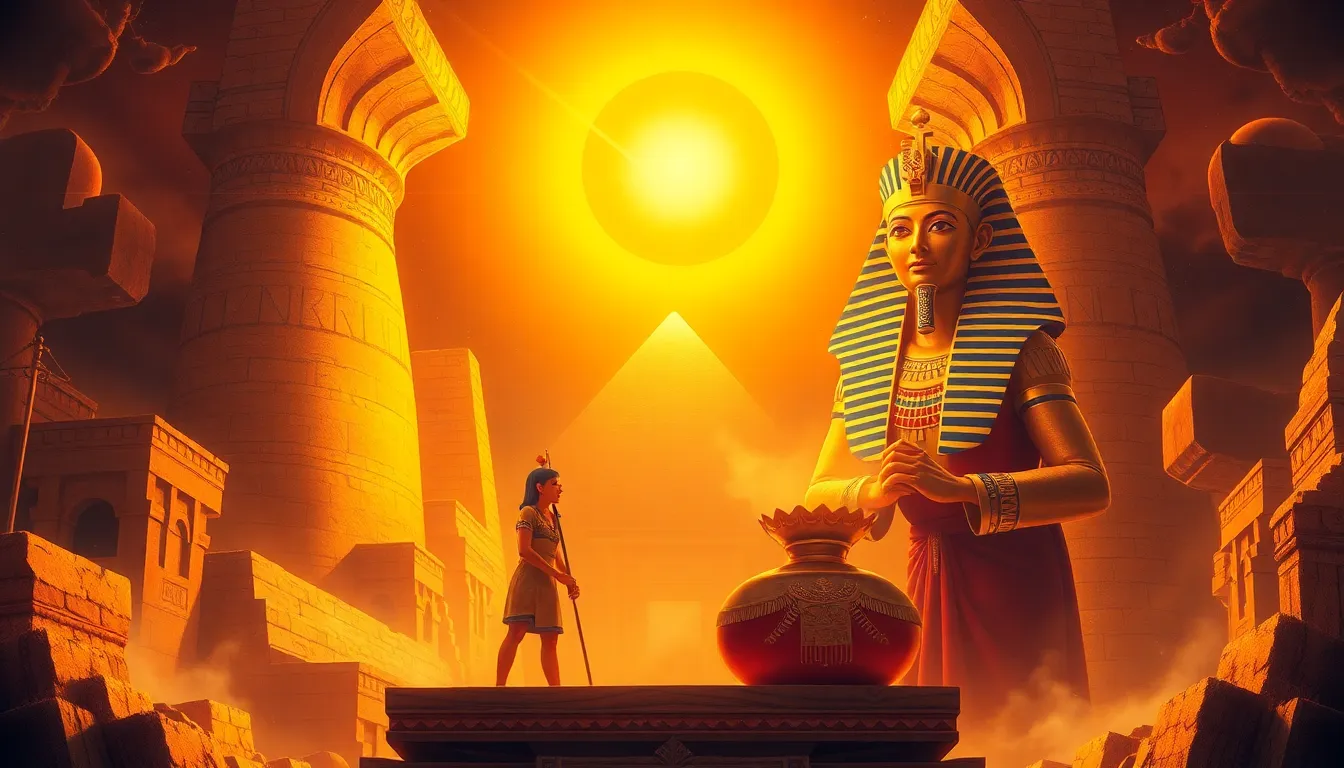The Pharaoh’s Divine Authority in Trade and Commerce
I. Introduction
The Pharaoh of ancient Egypt was not merely a political leader but a central figure in the cultural and religious tapestry of society. As a divine ruler, the Pharaoh’s role encompassed various aspects of governance, including the regulation of trade and commerce, which were critical for the economic stability of the kingdom. Trade was essential not only for the acquisition of goods but also for maintaining relationships with neighboring cultures. This article explores how the Pharaoh’s divine authority influenced trade practices and economic policies in ancient Egypt.
II. Historical Context of Trade in Ancient Egypt
The economic landscape of ancient Egypt evolved significantly through different dynasties. Initially, trade was primarily local, involving the exchange of goods between nearby communities. However, as Egypt expanded its borders and established trade routes, the complexity and volume of trade increased dramatically.
- The Old Kingdom: Notable for pyramid construction, trade was limited but included essential goods.
- The Middle Kingdom: Trade flourished with increased contact with Nubia and the Levant.
- The New Kingdom: Egypt established extensive trade networks, particularly with Punt and the Mediterranean.
Key trade routes, such as the Nile River, facilitated the movement of goods, while Egypt’s geography enabled the importation of exotic items like gold, incense, and ivory. The Nile served as a natural highway, connecting various regions and promoting commerce.
III. The Pharaoh as a Divine Figure
The concept of divine kingship was fundamental to ancient Egyptian society. The Pharaoh was seen as a living god, an intermediary between the gods and the people. This belief shaped the Pharaoh’s authority and justified their decisions regarding trade and economics.
- Relationship with the gods: The Pharaoh’s authority was believed to be divinely ordained, giving them the right to govern and control resources.
- Symbolism: The Pharaoh’s image appeared on trade commodities, reinforcing their influence and divine status in economic transactions.
IV. Regulation of Trade and Commerce by the Pharaoh
The Pharaoh implemented various laws and decrees to control trade practices within the kingdom. These regulations helped maintain order and protect the interests of the state.
- Laws and decrees: The Pharaoh issued commands that regulated prices, quality of goods, and trade practices.
- Trade monopolies: Certain commodities, like grain and gold, were often monopolized by the state, ensuring that profits benefitted the Pharaoh and the temple economy.
- International agreements: The Pharaoh played a crucial role in establishing trade relations with foreign nations, negotiating treaties that favored Egypt.
V. Economic Policies Reflecting Divine Authority
The economic policies of the Pharaoh often reflected their divine authority and governance style. Taxation and tribute systems were designed to support the state and the religious institutions.
- Taxation: Farmers paid taxes in the form of grain, which was vital for feeding the populace and supporting state projects.
- Religious festivals: Major festivals often involved trade fairs, boosting commerce and enriching the economy.
- Decrees: The Pharaoh’s edicts could significantly impact local economies, influencing everything from prices to the availability of goods.
VI. The Role of Priests and Officials in Trade Regulation
The relationship between the Pharaoh and religious leaders was integral to the regulation of trade. Priests served both religious and administrative functions, often overseeing trade operations.
- Partnerships: The Pharaoh relied on priests to manage temple estates, which were significant economic entities.
- Administrative structure: Officials were appointed to oversee markets, ensure trade compliance, and maintain order.
- Notable officials: Figures like Senenmut, who managed resources and trade, exemplify the critical role of officials in economic regulation.
VII. Impact of the Pharaoh’s Authority on Trade Relations with Neighboring Cultures
The Pharaoh’s divine status significantly affected trade relations with surrounding cultures, fostering exchanges that enriched Egyptian society.
- Nubia: Trade with Nubia involved gold, ivory, and slaves, enhancing Egypt’s wealth.
- Punt: Expeditions to Punt brought back valuable resources like incense and exotic animals.
- The Levant: Trade with Canaanites facilitated the exchange of goods and ideas, influencing Egyptian culture.
These trade relations also had a diplomatic dimension, as the Pharaoh’s divine authority often facilitated negotiations and alliances, promoting peace and stability.
VIII. Conclusion
The Pharaoh’s influence on trade and commerce in ancient Egypt was profound and multifaceted. As a divine ruler, the Pharaoh’s authority shaped economic practices, regulated trade, and established crucial diplomatic relations with neighboring cultures. The long-term effects of this divine governance model continue to offer insights into ancient economies and governance structures, highlighting the complex interplay between religion, politics, and commerce in shaping societal development.




